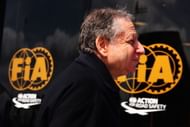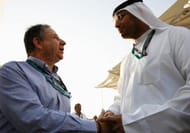It’s done and dusted. Jean Todt has been re-elected unanimously as the President of the FIA bringing an end to an almost one-sided contest. Though David Ward, the only other candidate against Todt, tried his best to find anomalies in the FIA electoral and governance systems, he lost his fight mid-way and had to withdraw his candidacy, unable to garner support from other members especially from Emirati tycoon Mohammed Bin Sulayem (who was touted to be in the race for the post as well). Ward had also challenged Todt in front of FIA’s ethics committee, claiming the Frenchman had sent out letters of support to various member clubs before the election process started, but the complaint was trashed.
Jean Todt was re-elected as the President of FIA for a second consecutive term that will end in 2017.
While some people argue that in his first four years at the helm of affairs Todt wasn’t able to get things moving, the counter-argument to the criticism is that the focus had been on road safety(for which he was awarded the ITU World Telecommunication and Information Society Award, 2013) and changes in the fundamental governing systems of motorsports. Todt’s experience with Ferrari definitely stood him in good stead at the time when Max Mosley stepped down from his post, but a more compelling question is what does his unopposed re-election mean for the future of the sport and whether it would help Formula One address some of the critical issues? Let’s find out.
The journey so far
In an attempt to bring about changes in the governing systems in motorsports, Todt along with his team helped to establish Statutes Commission. The Commission was entrusted with the responsibility of bring about reforms such as changes in the electoral process, empowering the FIA Senate, and the establishment of the FIA’s first ever independent Ethics Committee with a concern to safeguard the integrity and reputation of motor sport, automobile mobility and tourism.
The International Tribunal, which ruled on the Formula One regulations infringement involving Pirelli and Mercedes, was also formed in a bid to recommend penalties in the sport. The function and independence of the new body were universally praised.
Todt in an effort to reduce pollution in Formula One favoured the replacement of V8 engines by 1.6-litre turbo V6 engines incorporating energy recovery systems for 2014 despite resistance from commercial rights Chief Bernie Ecclestone. The signing of a new Concorde Agreement, which sets the framework upon which Formula One teams participate in the championship along with their commercial success from 2013-20, provided a boost to Todt’s candidature.
But Todt was also widely criticised for being unable to provide a level-playing field to all teams by deciding on a budget cap and in bringing down escalating costs in Formula One. Another criticism for Todt and his team was on the controversial regulation changes enforced by the FIA with respect to tyre changes introduced to encourage overtaking and improve the racing spectacle. But the wrong side of the changes were quite evident when Pirelli’s faster-wearing tyre compounds became a major talking point of the season after a series of spectacular blowouts at Silverstone. While FIA and Pirelli were fast to introduce Kevlar-belted tyres and a return to the previous year’s front tyre structure, both were criticised for putting driver safety at risk.
The Road ahead

Jean Todt has quite a few challenges ahead of him with cost control in Formula One being his utmost priority.
During his campaign, Todt and his team published their manifesto titled ‘The Road ahead’ outlining the steps the FIA intends to take in the years to come clearly focused on member clubs, mobility, sport, and sustainability. How much impact do these steps have on Formula One remains to be seen but the agenda of securing a long-term economic future through cost-cutting measures remains a priority. Todt needs to overcome resistance from some of the front running teams to get a budget cap agenda in place. Another concern for Todt would be of nurturing talented drivers. Currently Formula One remains a sport where talent takes a backseat while sponsorship’s and funding rises to the forefront. A prime example of the situation is Nico Hulkenberg who due to lack of funding finds it extremely difficult to move ahead of the mid-field teams.
Todt has also made his ambitions of taking motor-sport to the grass-root level such as karting in addition to going ahead with Formula E – a race conceived to attract fans and more importantly explore possibilities that exist in alternative technologies through the staging of clean and emissions-free racing.
With a confirmation of the second term, Todt has an opportunity to build a platform for the future of Formula One and motorsport in general. Formula One fans will be hoping he lives upto his reputation of someone who guided a team to an impressive five world championships and someone who knows motor-sport in and out.
